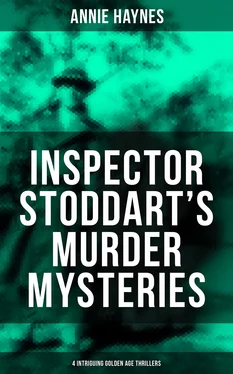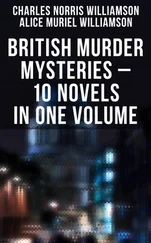"What of the man?" the inspector questioned sharply.
Mrs. Carr shook her head.
"I saw no more of him. But he must have been just up there when I heard the bang."
"Can you give us any description of him?" Stoddart asked.
"He was tall." Mrs. Carr's voice altered indefinably. Glancing at her, the inspector came to the conclusion that her eyes looked frightened. "And he stooped. There was only the light from the street lamps, you know, inspector, and it is gas, not electricity, in Park Road, so that I could not give any better description."
"And Miss Houlton?" the inspector said abruptly. "Where does she come in?"
"I can't tell," Mrs. Carr said in a puzzled tone. "She must have known who was guilty. And I can't help thinking that she knew or guessed something beforehand."
"What!" She had certainly succeeded in astonishing the inspector. "An accessory before the fact! Impossible!"
"Well, I don't know. But, when it was found that nobody could get into the consulting-room, I remembered that the garden door had been unlocked earlier in the evening, and thought it might still be open, so I ran round to see whether we could get in that way. But, though the garden gate was unfastened, the door into the consulting-room was locked. Then I went to the window. Sometimes it was open a little way at the top, and if it had been so that night I could have pushed it up and got in. However, it was not; but, much to my surprise, the curtain on the right side and the blind were so arranged that you could see straight into the room. Now I had drawn the curtains and blinds myself earlier in the evening, and I knew there was nothing of that kind then. It seemed to me that they must have been arranged on purpose."
"Quite!" The inspector nodded. "But why by Miss Houlton?"
"Well, I don't think anyone else had much opportunity. Miss Houlton would go in to see if there were any letters to answer probably. No one else went into the consulting-room except myself unless Miss Bastow or Miss Priestley had wished to speak to the doctor, and they wouldn't have altered the curtains. Besides, as they stated at the inquest, neither of them did go in that evening. The doctor did not like being interrupted when he was busy with his research work, as he had been all that week."
"What about Basil Wilton?"
"He did go in occasionally, of course. But I think he was exceptionally busy in the surgery that day. And besides, as we have all heard, the doctor had dismissed Mr. Wilton. He would not go in if he could help it. And if he had meant to shoot the doctor he would not have arranged the curtains so that he could be seen. No, I have always thought that by one of the two who were in the garden—the tall man or Miss Houlton—that spy-hole had been arranged either that the doctor could be shot through it, or so that the other could watch what was done. They must have been accomplices, it seems to me."
"Possibly." The inspector drummed with his fingers more energetically on the table and stared at them in silence. Then he raised his head and gave Mrs. Carr one of those sharp penetrating glances of his. "Now one or two questions, please. Why do you imagine that Basil Wilton married Miss Houlton? Was it because through that spy-hole she had seen him shoot Dr. Bastow and blackmailed him?"
"No, I am sure it was not," Mrs. Carr said at once. "Mr. Wilton was still occupied with his patient when I came back. He let him out a few minutes later. As to why he married Miss Houlton—" She shrugged her shoulders.
"Well, the doctor had refused to allow the engagement with his daughter, and Miss Houlton and Mr. Wilton had always been rather friendly. I have often come upon them talking together. I suppose she caught him on the rebound. Any more questions, inspector?"
"Yes." The inspector gazed at her as though he would read her very soul. "Did you recognize this man that you saw enter the garden?"
"I have told you that I couldn't see him plainly." Obviously Mrs. Carr was growing restive. "I couldn't have recognized anyone at that distance in that light."
"Yet you have no doubts as to Miss Houlton's identity."
For the first time Mrs. Carr appeared discomposed under this examination.
"I was not so far away from her. Besides, I was more familiar with her appearance."
"The man might have been quite as familiar to you if you could have seen him more closely," the inspector argued shrewdly. "Had this man a beard, Mrs. Carr?"
"I don't know—I am not sure," she stammered. "I know that he was tall and thin. Yes, and now that I think about it I believe he had a beard."
"Ah! That was what I expected to hear," the inspector said as he rose. "Well, Mrs. Carr, probably both sides may be interested to hear your statement. Of course you will be wanted at the trial."
Mrs. Carr stood up too.
"Trial!" she echoed. "What trial? Surely, surely my evidence will clear Basil Wilton?"
The inspector coughed.
"Basil Wilton is not being tried for the murder of Dr. Bastow. Your evidence has nothing to do with the charge of killing his wife."
"But I thought—he was suspected of both murders and that if he could be proved innocent of one it would be assumed that he committed neither," Mrs. Carr persisted.
The inspector smiled faintly.
"I am afraid the law is not quite so easily satisfied. Should Basil Wilton be acquitted at the forthcoming trial, he will almost certainly be re-arrested and charged with murdering Dr. Bastow. Your evidence will then be of the greatest value."
Mrs. Carr pulled her hat lower and turned her collar up with trembling fingers.
"Then—then I need not have come—it is no use?"
"On the contrary, madam, your evidence may have been of far greater value than we any of us realize at the present moment," the inspector said politely. "Should it be needed you will be subpoenaed, of course; 55 Southfield Gardens, isn't it?"
Mrs. Carr stared at him. "You—you know?"
Stoddart bowed.
"It is not easy to hide your address from the C.I.D. But I am bound to confess that you puzzled us at first."
He attended her to the door and then turned back to Harbord.
"Umph! Not much help, was she?"
"Not much," Harbord agreed. "But I think she might have been, if she had liked—"
The inspector smiled, his keen eyes for once looking dreamy as he gazed at the chair in which Mrs. Carr had sat, as he sniffed the faint, elusive scent that seemed to cling about her garments.
"Ah! That is the point. I didn't need her to tell me Basil Wilton was innocent. But if she had liked to tell us all she knew—And now to business."
He opened a big ledger-like book that lay on the table and sat down before it.
"Do you know what this is?"
Harbord looked curious.
"No, sir."
"Dr. Bastow's case-book. I tell you, Alfred, I have always been certain the secret he had discovered, and for the discovery of which he was murdered, had nothing to do with research work, and I am going through this book, beginning a fortnight before the doctor's death and looking into every case personally. I feel sure that presently by process of elimination I shall arrive at the one which put the doctor on the track of the secret which meant death. Now where are we to-day?—Monnet—Rendal, chemist. Neith Street, Clapham, S.W. Um—um—seems to have been a case of a woman in a street accident carried into nearest shop, which happened to be a chemist's, and from thence to a nursing home. Well, it doesn't sound likely. But I will give it a little investigation, as I am going through all the cases, likely and unlikely. I think you and I will take a journey down to Clapham this afternoon, Harbord. By the way, I suppose this is accidental?"
"What is accidental?" Harbord questioned, leaning forward.
Stoddart pointed to the page.
Читать дальше












